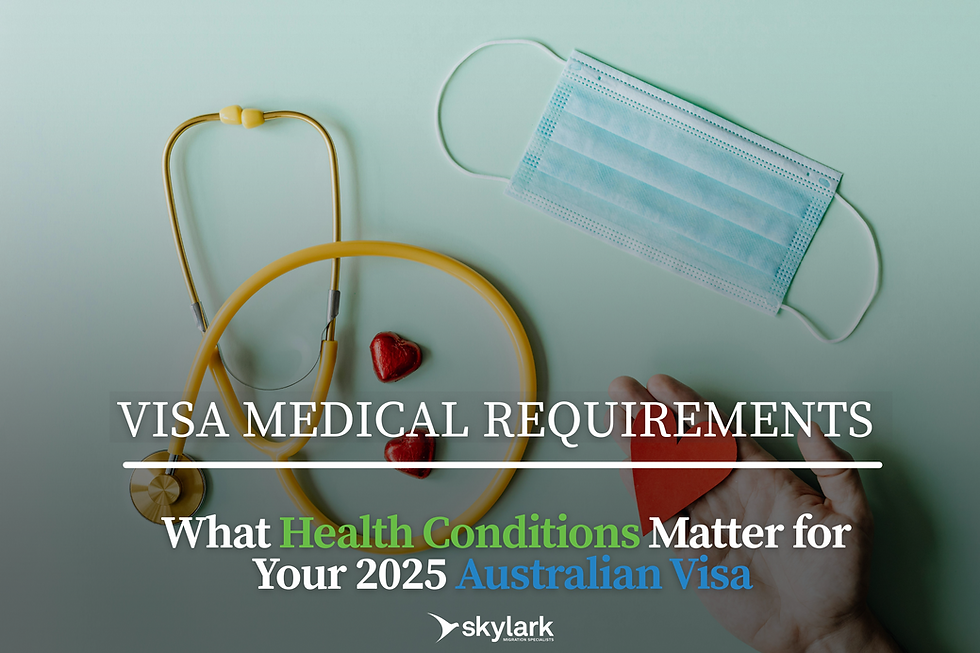Visa Medical Requirements in Australia: What Health Conditions Matter for Your 2025 Visa
- skylarkmigrationma
- Jul 25
- 3 min read

When you apply for an Australian visa, your health assessment can really influence the outcome, sometimes in ways you wouldn’t expect. That’s why understanding the visa medical requirements 2025 is so important.
We’ve based this article on official Freedom of Information (FOI) data from 2015 -16, released by the Department of Home Affairs. Government‑verified and factual, this data gives a clear snapshot of how health conditions historically impacted visa decisions.
Understanding Visa Medical Requirements in Australia
You’re required to complete a medical exam with an approved panel physician. After that, a Medical Officer of the Commonwealth (MOC) reviews your file under Public Interest Criteria PIC 4005 or PIC 4007. As part of the visa medical requirements 2025, they’ll ask: could this condition
pose a public health risk?
rack up significant healthcare or community‑service costs?
limit Australians’ access to essential services?
If the answer is yes to any of these, you might be marked as not meeting the requirements, which can lead to delays, more paperwork, or even refusal.
Conditions That Can Raise Flags
According to the 2015–16 FOI data, these conditions were more likely to cause delays or refusals:
HIV, because of ongoing treatment and associated costs
Chronic hepatitis B, given the need for regular care
Severe rheumatoid arthritis, especially where continuous specialist attention is required
Each case is handled individually. Detailed medical reports, proof of stable treatment, or signing a health undertaking can help ease concerns.
Conditions That Usually Don’t Cause Trouble
These conditions generally don’t trip visa outcomes when properly managed:
Pregnancy, since it’s temporary and expected
Thyroid disorders, when controlled with routine medication
Well‑managed diabetes, especially when it doesn’t require specialist intervention
These typically stay within acceptable limits for public cost and care.
What’s a Health Undertaking?
When a condition raises concerns but is manageable, you may be asked to sign a health undertaking. It’s basically a written promise that you’ll cover your healthcare privately and won’t rely on Australia’s public system. Under the visa medical requirements 2025, this is often a practical way to address government concerns without derailing your visa process.
Key Details About Visa Medical Requirements
What’s classified as a public health risk?
Primarily communicable diseases. Think active tuberculosis, measles, anything that could spread. The focus is safeguarding the community.
How is the "average cost" calculated?
The Department of Home Affairs uses public spending data from the Australian Institute of Health and Welfare, usually over five years, updated every two years. They account for hospital stays, GP visits, medications, disability services, aged care and more.
What’s the Significant Cost Threshold (SCT)?
Currently (2025), SCT is set at AUD 86,000. If your condition is projected to cost more than that over your stay, or over ten years for permanent visas, it’s flagged as significant. That puts you at higher risk of not meeting the health requirement.
What This Means for You
Health conditions aren’t automatic visa blockers. But they can complicate things.
Risks include disease spread, exceeding cost thresholds, or needing resource-limited services. Having a clear, up-to-date medical plan or a signed health undertaking can ease those risks.
Keep in mind that the FOI data from 2015–16 shows how these rules were applied in practice, and those practices still shape decisions today.
Summary Table
Issue | Why It Matters |
Public health risks | Risk of spreading disease impacts eligibility |
Projected costs over AUD 86,000 | Could place too much strain on public services |
Use of scarce services | May affect access for Australian citizens |
Health undertaking | Demonstrates responsibility and reduces concern |
200s of 5⭐ reviews and recommendations